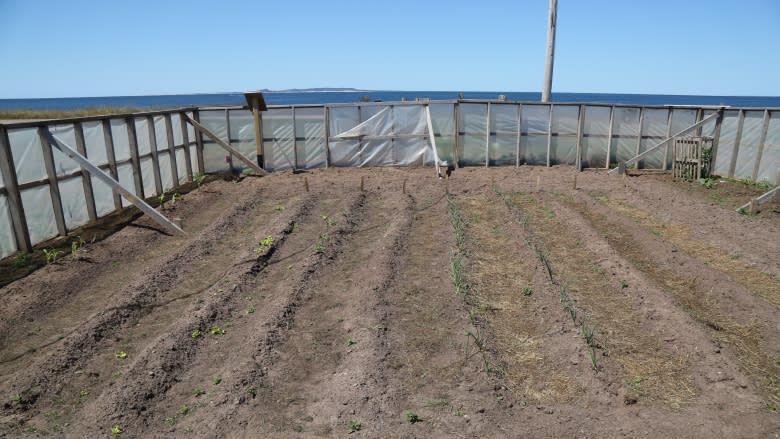Drier summers and unpredictable harvests for Magdalene Islands farmers
The logo for the award-winning Pied-De-Vent cheese shows cows basking in the sunlight and scenery of the Gulf of St. Lawrence, on the islands' iconic grassy mounds.
But the rolling hills have more of a yellow tinge this year.
''The pasture yield has been pretty disastrous,'' said Dominic Arseneau, the director of dairy production at the Léo et Fils farm, which owns the Pied-De-Vent.
The cheese factory on the Magdalene Islands, Que., has built its reputation on its grass-fed cow's milk.
But as for many companies on the Islands, traditional farming methods are changing to adapt to drier conditions and irregular rain patterns.
Arseneau's 60 cows have already run out of fresh grass for the summer, which means he has to import animal feed from Prince Edward Island, located 150 kilometres south of the Islands.
He also has had to dip into his reserve of hay that is usually kept for winter.
Arseaneau said changing the cows' diets inevitably has an impact on their production.
''You can't compare nice fresh grass to hay,'' he said.
Less nectar for bees
Jules Arseneau has been a beekeeper on Havre-aux-Maisons Island for more than 20 years.
He said his bees definitely have to work harder this summer.
''They move from one flower to the other because there isn't a lot of nectar,'' he said.
Arseneau said he has to be vigilant to make sure the bees have enough honey in the hive to grow and keep the queen bee content.
Nevertheless, he says the Magdalene Islands' bio-diversity is a huge asset.
''Since there is a great floral diversity on the Islands and it's not just plains, certain species will continue to flower in drier conditions.''
Arseneau said fellow beekeepers in other regions are having a tougher time though, especially in the Gaspé.
'Canary in the coal mine'
Environment Canada's data shows rain patterns have shifted over the past years. On average, 75 millimetres of rain fall on the Magdalene Islands during the month of July.
But since 2014, the total annual precipitation for July has been about half that — with this year topping at 31 millimetres.
The month of August 2016 was four times drier than average, with only 21 millimetres of rain for the whole month.
''We've never known ideal conditions so we've always relied on plan B or C to get our vegetables to market,'' said Nata Porowska, owner of an organic farm on Havre-Aubert Island.
Porowska said for the five years Green Haven Gardens has been in operation, it hasn't had one season without a momentary drought.
She said the former land owners only watered their fields twice in 30 years of farming, but temporary irrigation systems have been needed ever since Green Haven Gardens took on the farm.
Nonetheless, Porowska, who is also a biologist, is confident in the resilience of people on the Magdalene Islands.
''We really are a canary in the coal mine,'' she said, arguing that the techniques developed on the Magdalene Islands can serve as a model for agriculture in the rest of Quebec.
''What we have to deal with on a small scale is usually something that is preparing at a larger scale for larger systems.''



